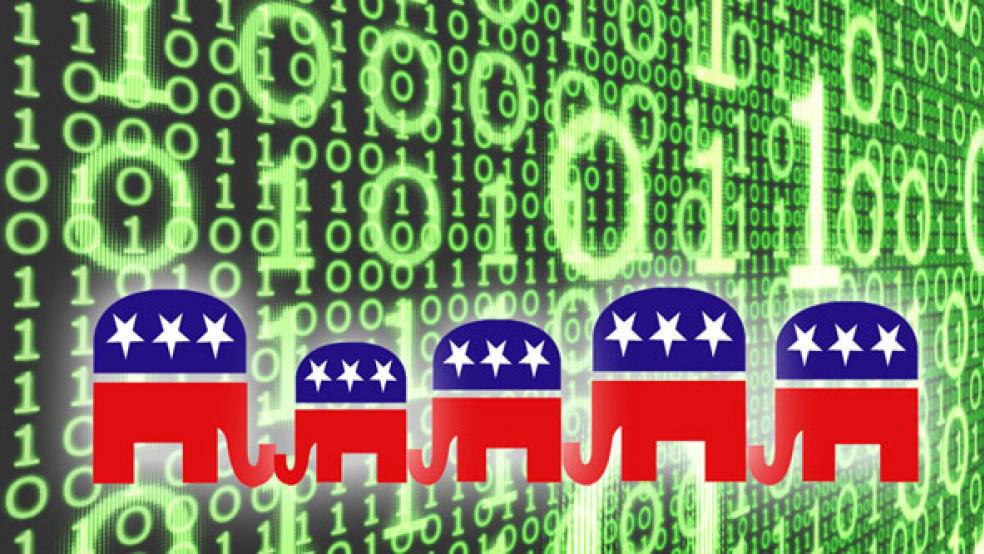On Wednesday, the House Budget Committee voted to force the Congressional Budget Office to produce deceptive budget data. It is part of a longstanding Republican effort to prevent the government from producing data that conflicts with Republican ideology.
One of the measures adopted by the Budget Committee is called the “Pro-Growth Budgeting Act of 2013” (H.R. 1874). It would require the CBO to calculate the macroeconomic impact of any legislation that would have more than a 0.25 percent impact on the gross domestic product in any year over the following decade.
This sounds harmless, but has an insidious purpose. First, it would require the CBO effectively to do a macroeconomic estimate of many bills just to determine whether the 0.25 percent threshold is met. Thus it will impose an additional work requirement on the agency without providing any additional resources.
But the true purpose of the legislation is to institutionalize the Laffer curve into tax analysis. The Laffer curve says that some tax cuts may pay for themselves by expanding the tax base more than taxes are cut.
There are, of course, some cases where the Laffer curve may be true. But in recent years, Republicans have routinely asserted that all tax cuts pay for themselves. For example, in 2010, Senate Minority Leader Mitch McConnell said, “There’s no evidence whatsoever that the Bush tax cuts actually diminished revenue. They increased revenue, because of the vibrancy of these tax cuts in the economy.”
McConnell added, “That’s been the majority Republican view for some time.”
I have many other examples in my files of congressional Republicans denying that tax cuts ever increase the budget deficit. But of course they do.
Proof that the Budget Committee legislation is dishonest is a provision which exempts legislation that increases spending from the macroeconomic estimate requirement. It does so deceptively by saying that bills reported by the House and Senate appropriations committees are not covered by the requirement.
But obviously, if tax changes can have a macroeconomic impact, then so can spending increases or cuts. Many economists have argued that the budget sequester, which is sharply cutting spending, has slowed economic growth. Republicans deny it and want their view institutionalized in the budget process.
This is not the end of Republican duplicity. Another bill passed by the Budget Committee on June 19, called the “Baseline Reform Act” (H.R. 1871), would force CBO to calculate its budget baseline without including an estimate for the effects of inflation. As the Budget Committee summary states, the legislation “removes the assumption that discretionary spending will increase by inflation in each year of the baseline.”
This is complicated, but important. You see, when the CBO estimates future spending it must necessarily make certain assumptions. One is that when Congress creates a spending program that its intent is to maintain spending in real terms, adding spending as necessary to compensate for inflation.
Obviously, if inflation is not taken into account then real spending will fall by the rate of inflation. Every worker understands that if she doesn’t get a cost-of-living adjustment for inflation or an increase less than the rate of inflation then she is worse off. It’s the same for government programs.
Republicans have long railed against the assumption that spending should keep pace with inflation, believing that it fuels unjustified government spending. They often assert that if a program gets any increase at all, even if it’s not enough to keep pace with inflation, that this is per se an unjustified spending increase.
Republicans also argue that the only meaningful spending cut is one that reduces the literal dollar amount of spending from one year to the next. But of course, in a period of inflation that means that no nominal spending increase is in fact a cut in real terms, which is what Republicans want.
The only purpose of this legislation is to obfuscate the effect of inflation on spending so that it will be easier for Republicans to slash it without appearing to do so. They can hold constant spending for programs they don’t like, but are afraid to cut openly, and simply let inflation do their dirty work, while claiming that they haven’t cut spending at all.
This is part of a long-term effort to eliminate data collection or pervert it so that policy is biased toward Republican priorities. For example, Republicans have:
- Forced the Internal Revenue Service to drop a program called the Taxpayer Compliance Measurement Program in order to make the extent of tax evasion harder to calculate. This has made it easier to cut the IRS budget.
- Abolished the Office of Technology Assessment and the Advisory Commission on Intergovernmental Relations because they often produced widely respected data that conflicted with Republican dogma on issues such as global warming.
- Prohibited the federal government from collecting data on the cost of gun-related injuries and death in order to prevent it from being used by gun control supporters.
- Are currently attempting to defund a Census Bureau program called the American Community Survey. Among other things, it would eliminate the government’s ability to properly calculate the unemployment rate. Republicans claim it is too intrusive.
There are many other examples as well. It’s almost as if Republicans instinctively distrust any fact that conflicts with what they want to believe. Thus during the 2012 campaign, many Republicans simply refused to believe polls showing Mitt Romney losing to Barack Obama. A few also accused the Bureau of Labor Statistics of doctoring data showing that the unemployment rate was falling.
These efforts to deny, abolish and distort basic data for partisan purposes is insidious and reprehensible. Republicans should be ashamed.






